人教版八年级英语下册全单元导学案
- 格式:doc
- 大小:66.00 KB
- 文档页数:11

Unit 1 What’s the matter(Section A 1a-2d)学习目标:1.我要会用本课所学四会单词短语;2.阅读理解对话、短文并能复述,能用所学词汇、句型进行情景口头表达和书面表达;2我能使用should及shouldn’t对不同健康问题给出有针对性的合理建议;3. 我要提升听、说能力。
重点,难点:1.学会表达身体的各种不适;2. 识记对于不同健康问题的针对性建议的词汇;灵活给出建议;3.使用英语与同学灵活、自由、更深层次地谈论身体健康的话题。
独学准备:1.独学1a-2d中的单词及短语2.自读对话2d两次,把握大意,划出不懂之处并自己查字典解决当堂测评分层达标一.自主学习:1.完成下列短语翻译。
发烧_____________; 躺下休息 ______________; 喝大量的水_____________;看牙医 __________; 加蜂蜜的热茶___________ ;看牙医/医生 ;拍x光片____________; 患咳嗽的病_____________;伤到自己_____________;量体温__________;敷上药_____________;嗓子疼_______________;二.根据首字母提示和句意提示填空。
1. I have a toothache, I have to see a d______.2. She is tired, she should go to bed early, she s______ go to the party.3. When you have a headache, please lie down and r______.4. I have a t____ __, so I want to see a dentist.5.–I have a stomachache .- You shouldn’t eat a______ .6. Open your m______ and say “AH” .7. It’s a good habit to brush your t ______twice a day .三、用所给单词的适当形式填空。
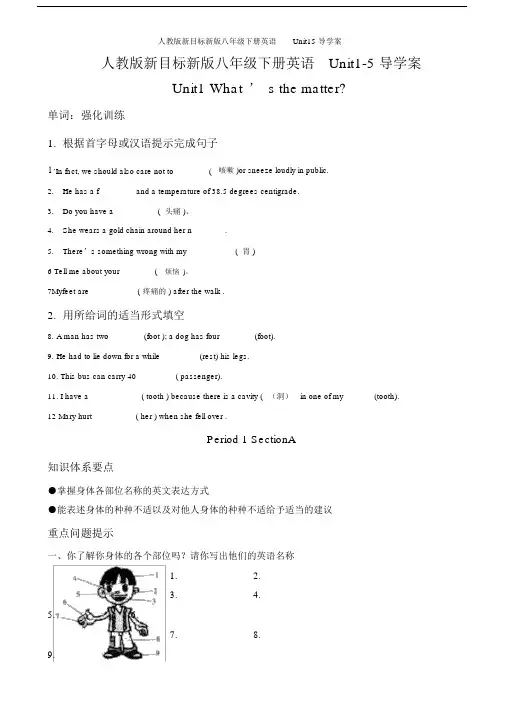
人教版新目标新版八年级下册英语Unit1-5 导学案Unit1 What’ s the matter?单词:强化训练1.根据首字母或汉语提示完成句子1 . In fact, we should also care not to _______ ( 咳嗽 )or sneeze loudly in public.2.He has a f________ and a temperature of 38.5 degrees centigrade.3.Do you have a _________ ( 头痛 )、4.She wears a gold chain around her n_______ .5.There’s something wrong with my __________ ( 胃 )6 Tell me about your _______ (烦恼)。
7Myfeet are __________ ( 疼痛的 ) after the walk .2.用所给词的适当形式填空8.A man has two _______ (foot ); a dog has four _______ (foot).9.He had to lie down for a while ________ (rest) his legs.10.This bus can carry 40 ________ ( passenger).11. I have a ___________ ( tooth ) because there is a cavity ((洞)in one of my ______ (tooth).12 Mary hurt _________ ( her ) when she fell over .Period 1 SectionA知识体系要点●掌握身体各部位名称的英文表达方式●能表述身体的种种不适以及对他人身体的种种不适给予适当的建议重点问题提示一、你了解你身体的各个部位吗?请你写出他们的英语名称1. 2.3. 4.5. 6.7.8.9.二.语言目标●What’ s the matter? I have a headache.●You should drink some tea. The sounds like a good idea.I. 英汉互译 1a-2b1. 噪子痛2.have a cold3. 躺下休息4.see a dentist5. 大量饮水6.hot tea with honey7. 牙痛8.have a headache9. 肚子疼10.have a fever11 照X 光片12 量体温13 割伤自己14 在上面敷些药2d. 翻译下列句子:(重难点句子)1.You need to take breaks away from the computer 。
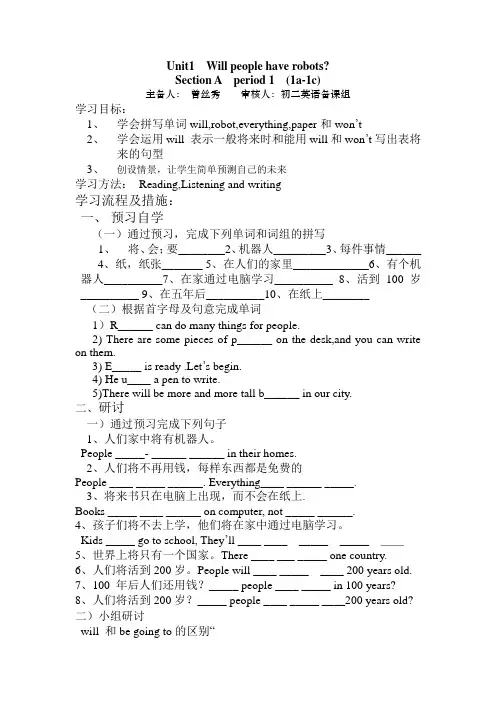
Unit1 Will people have robots?Section A period 1 (1a-1c)主备人:曾丝秀审核人:初二英语备课组学习目标:1、学会拼写单词will,robot,everything,paper和won’t2、学会运用will 表示一般将来时和能用will和won’t写出表将来的句型3、创设情景,让学生简单预测自己的未来学习方法:Reading,Listening and writing学习流程及措施:一、预习自学(一)通过预习,完成下列单词和词组的拼写1、将、会;要________2、机器人_________3、每件事情______4、纸,纸张_______5、在人们的家里_____________6、有个机器人__________7、在家通过电脑学习__________8、活到100岁__________9、在五年后__________10、在纸上________(二)根据首字母及句意完成单词1)R______ can do many things for people.2) There are some pieces of p______ on the desk,and you can write on them.3) E_____ is ready .Let’s begin.4) He u____ a pen to write.5)There will be more and more tall b______ in our city.二、研讨一)通过预习完成下列句子1、人们家中将有机器人。
People _____- ______ ______ in their homes.2、人们将不再用钱,每样东西都是免费的People ____ _____ ______. Everything____ ______ _____.3、将来书只在电脑上出现,而不会在纸上.Books _____ ____ ______ on computer, not _____ ______.4、孩子们将不去上学,他们将在家中通过电脑学习。
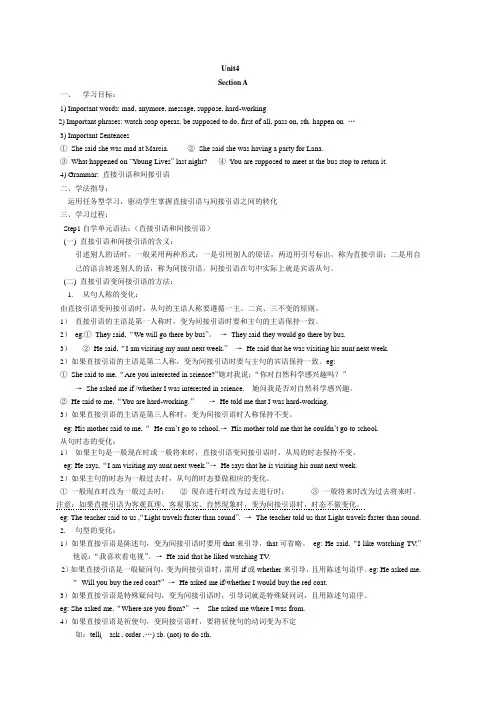
Unit4Section A一、学习目标:1) Important words: mad, anymore, message, suppose, hard-working2) Important phrases: watch soap operas, be supposed to do, first of all, pass on, sth. happen on …3) Important Sentences①She said she was mad at Marcia. ②She said she was having a party for Lana.③What happened on “Young Lives” last night? ④You are supposed to meet at the bus stop to return it.4) Grammar: 直接引语和间接引语二、学法指导:运用任务型学习,驱动学生掌握直接引语与间接引语之间的转化三、学习过程:Step1自学单元语法:(直接引语和间接引语)(一) 直接引语和间接引语的含义:引述别人的话时,一般采用两种形式:一是引用别人的原话,两边用引号标出,称为直接引语;二是用自己的语言转述别人的话,称为间接引语。
间接引语在句中实际上就是宾语从句。
(二) 直接引语变间接引语的方法:1.从句人称的变化:由直接引语变间接引语时,从句的主语人称要遵循一主、二宾、三不变的原则。
1)直接引语的主语是第一人称时,变为间接引语时要和主句的主语保持一致。
2)eg:①They said,“We will go there by bus”。
→They said they would go there by bus.3)②He said,“I am visiting my aunt next week.”→He said that he was visiting his aunt next week.2)如果直接引语的主语是第二人称,变为间接引语时要与主句的宾语保持一致。
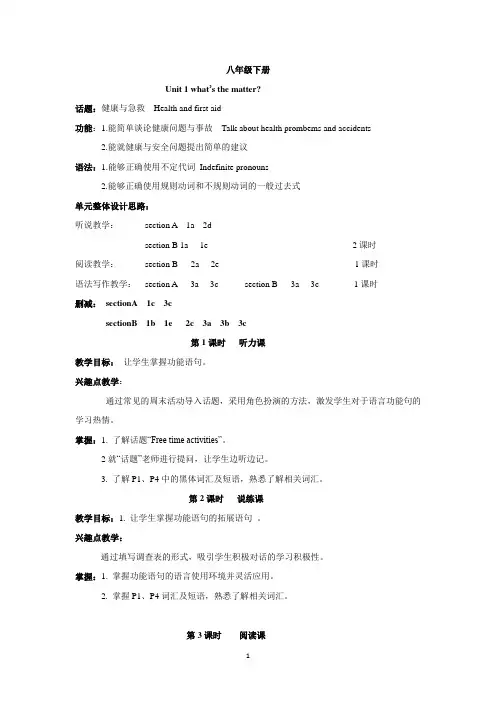
八年级下册Unit 1 what’s the matter?话题:健康与急救Health and first aid功能:1.能简单谈论健康问题与事故Talk about health prombems and accidents2.能就健康与安全问题提出简单的建议语法:1.能够正确使用不定代词Indefinite pronouns2.能够正确使用规则动词和不规则动词的一般过去式单元整体设计思路:听说教学:section A 1a---2dsection B 1a----1e 2课时阅读教学:section B 2a----2e 1课时语法写作教学:section A 3a----3c section B 3a----3c 1课时删减:sectionA 1c 3csectionB 1b 1e 2c 3a 3b 3c第1课时听力课教学目标:让学生掌握功能语句。
兴趣点教学:通过常见的周末活动导入话题,采用角色扮演的方法,激发学生对于语言功能句的学习热情。
掌握:1. 了解话题“Free time activities”。
2就“话题”老师进行提问,让学生边听边记。
3. 了解P1、P4中的黑体词汇及短语,熟悉了解相关词汇。
第2课时说练课教学目标:1. 让学生掌握功能语句的拓展语句。
兴趣点教学:通过填写调查表的形式,吸引学生积极对话的学习积极性。
掌握:1. 掌握功能语句的语言使用环境并灵活应用。
2. 掌握P1、P4词汇及短语,熟悉了解相关词汇。
第3课时阅读课教学目标:1. 培养学生阅读的基本技巧2. 掌握P5页的词汇及阅读中涉及的常用表达的用法兴趣点教学:通过引导学生观察2a 的图片,采用猜词并给予奖励的方法,激发学生的兴趣。
掌握:1. 让学生掌握阅读中涉及的词汇及常用表达的用法2. 让学生学会初步的阅读技巧第4课时语法写作课教学目标:总结单元功能语句和常用表达,并以写作的方式呈现。
兴趣点教学:把班级分成几个活动小组,每个小组安排一个采访人,采访人要进行采访记录,每组向全班汇报各自的采访建议,从而汇总信息,积累写作素材,完成写作任务。
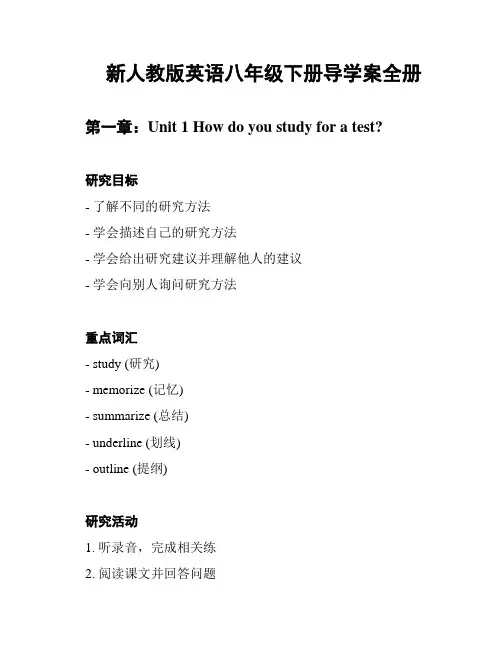
新人教版英语八年级下册导学案全册第一章:Unit 1 How do you study for a test?研究目标- 了解不同的研究方法- 学会描述自己的研究方法- 学会给出研究建议并理解他人的建议- 学会向别人询问研究方法重点词汇- study (研究)- memorize (记忆)- summarize (总结)- underline (划线)- outline (提纲)研究活动1. 听录音,完成相关练2. 阅读课文并回答问题3. 观看视频,了解不同的研究方法4. 小组讨论:描述自己的研究方法并给予建议5. 打开研究社区网站,询问他人研究方法拓展活动- 编写一篇短文介绍自己最有效的研究方法,并分享给同学们。
第二章:Unit 2 I used to be afraid of the dark.研究目标- 理解和使用used to的用法- 描述过去和现在的变化- 研究如何克服恐惧并充满勇气- 学会给予鼓励和支持重点词汇- used to (过去常常)- frightened (害怕的)- courage (勇气)- encourage (鼓励)研究活动1. 阅读课文,了解主人公的变化2. 讨论在生活中的变化和克服恐惧的经历3. 观看鼓励和支持的视频4. 小组活动:给予同组成员鼓励和支持5. 与语伴进行练,描述自己的变化和克服恐惧的经历拓展活动- 编写一篇故事,描述一个人如何克服恐惧并变得勇敢,并与同学们分享。
(以下章节内容省略)总结本册教材主要围绕研究方法和个人成长展开。
通过研究不同的研究方法和分享个人经验,学生可以提高研究效果并培养勇气与自信。
同时,通过鼓励和支持他人,学生也能积极参与集体活动。
对于学生们来说,在实践中运用所学知识,并与他人互动,是提高英语能力和培养社交技巧的重要途径。
希望同学们能够积极参与课堂活动,享受研究的乐趣,不断提升自我。
*以上为大致导学案内容,具体根据教材内容进行调整与完善。
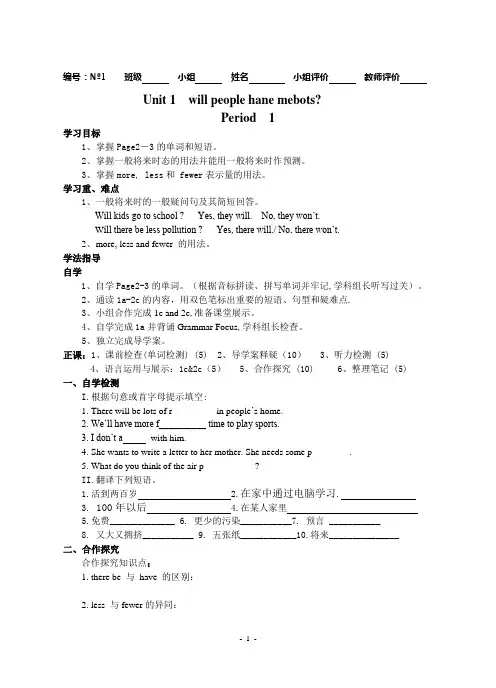
编号:№1 班级小组姓名小组评价教师评价Unit 1 will people hane mebots?Period 1学习目标1、掌握Page2-3的单词和短语。
2、掌握一般将来时态的用法并能用一般将来时作预测。
3、掌握more, less和 fewer表示量的用法。
学习重、难点1、一般将来时的一般疑问句及其简短回答。
Will kids go to school ? Yes, they will. No, they won’t.W ill there be less pollution ? Yes, there will./ No, there won’t.2、more, less and fewer 的用法。
学法指导自学1、自学Page2-3的单词。
(根据音标拼读、拼写单词并牢记,学科组长听写过关)。
2、通读1a-2c的内容,用双色笔标出重要的短语、句型和疑难点.3、小组合作完成1c and 2c,准备课堂展示。
4、自学完成1a并背诵Grammar Focus,学科组长检查。
5、独立完成导学案。
正课:1、课前检查(单词检测) (5)2、导学案释疑(10)3、听力检测 (5)4、语言运用与展示:1c&2c(5)5、合作探究 (10)6、整理笔记 (5)一、自学检测I.根据句意或首字母提示填空:1. There will be lots of r_________ in people’s home.2. We’ll have more f__________ time to play sports.3. I don’t a with him.4. She wants to write a letter to her mother. She needs some p________.5. What do you think of the air p___________?II.翻译下列短语。
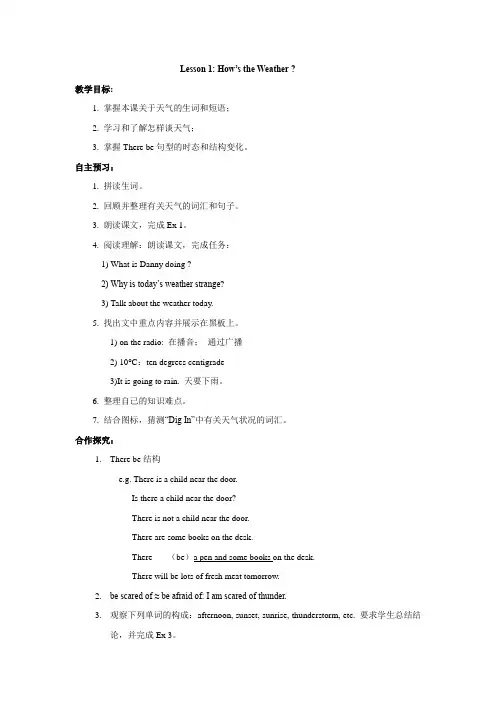
Lesson 1: How’s the Weather ?教学目标:1. 掌握本课关于天气的生词和短语;2. 学习和了解怎样谈天气;3. 掌握There be句型的时态和结构变化。
自主预习:1. 拼读生词。
2. 回顾并整理有关天气的词汇和句子。
3. 朗读课文,完成Ex 1。
4. 阅读理解:朗读课文,完成任务:1) What is Danny doing ?2) Why is today’s weather strange?3) Talk about the weather today.5. 找出文中重点内容并展示在黑板上。
1) on the radio: 在播音;通过广播2) 10°C:ten degrees centigrade3)It is going to rain. 天要下雨。
6. 整理自己的知识难点。
7. 结合图标,猜测“Dig In”中有关天气状况的词汇。
合作探究:1.There be结构e.g. There is a child near the door.Is there a child near the door?There is not a child near the door.There are some books on the desk.There ___(be)a pen and some books on the desk.There will be lots of fresh meat tomorrow.2.be scared of ≈ be afraid of: I am scared of thunder.3.观察下列单词的构成:afternoon, sunset, sunrise, thunderstorm, etc. 要求学生总结结论,并完成Ex 3。
当堂检测:1.根据句意及首字母或汉语提示填空:1) I was caught in the rain in a ___________(阵雨) on my way to school.2) In Britain, the sun ______(落下)much later in summer.3) We need to know the ________(准确的) time.4) They are talking about s________ and sunset.5) Please don’t go out this afternoon. There will be a heavy t________.2. 单项选择:1)Jane wanted to learn English _____ the radio.A. inB. withC. throughD. on2) _____ is the temperature today?A. WhatB. HowC. How manyD. How much3) Don’t be _____ the young man.A. scared toB. scared ofC. angry toD. angry of4) There _____ be a rain the day after tomorrow.A. shallB. are going toC. is goingD. will作业布置:1. 整理笔记,复习本课知识点;2. 运用相关句式,口头练习天气预报的播报;3. 完成《练习册》L1作业;4. 按照既往要求,预习L2,初步完成Ex1 & Ex2.板书设计:教后反思:Lesson 2 It”s Getting Warmer学习目标:1.学生能正确的听、说、读、写neither;nor ;boot ; jasmine ;blossom ; sunshine ;Tai Chi ;swing。
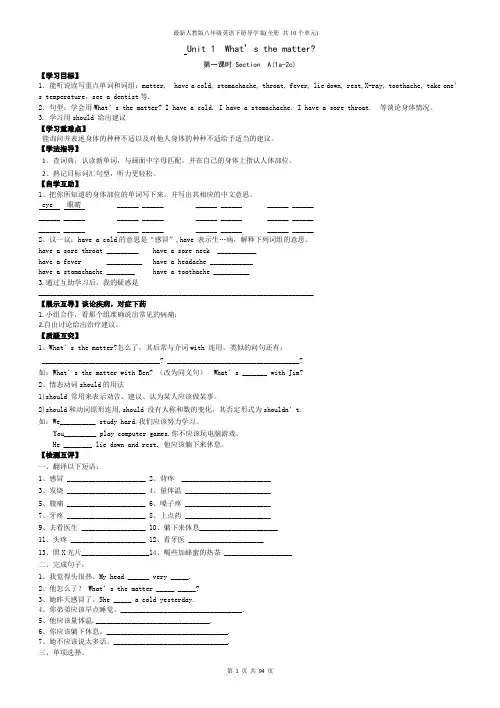
Unit 1 What’s the matter?第一课时 Section A(1a-2c)【学习目标】1.能听说读写重点单词和词组:matter, have a cold, stomachache, throat, fever, lie down, rest,X-ray, toothache, take one’s temperature,see a dentist等.2.句型:学会用What’s the matter? I have a cold. I have a stomachache. I have a sore throat. 等谈论身体情况。
3. 学习用should 给出建议【学习重难点】能询问并表述身体的种种不适以及对他人身体的种种不适给予适当的建议。
【学法指导】1、查词典,认读新单词,与画面中字母匹配,并在自己的身体上指认人体部位。
2、熟记目标词汇句型,听力更轻松。
【自学互助】1、把你所知道的身体部位的单词写下来,并写出其相应的中文意思。
eye 眼睛 ______ ______ ______ ______ ______ ____________ ______ ______ ______ ______ ______ ______ ____________ ______ ______ ______ ______ ______ ______ ______2、议一议:have a cold的意思是“感冒”,have 表示生…病,解释下列词组的意思。
have a sore throat _________ have a sore neck ___________have a fever __________ have a headache ____________have a stomachache ________ have a toothache __________3.通过互助学习后,我的疑惑是_____________________________________________________________________________【展示互导】谈论疾病,对症下药1.小组合作,看那个组准确说出常见的病痛;2.自由讨论给出治疗建议。
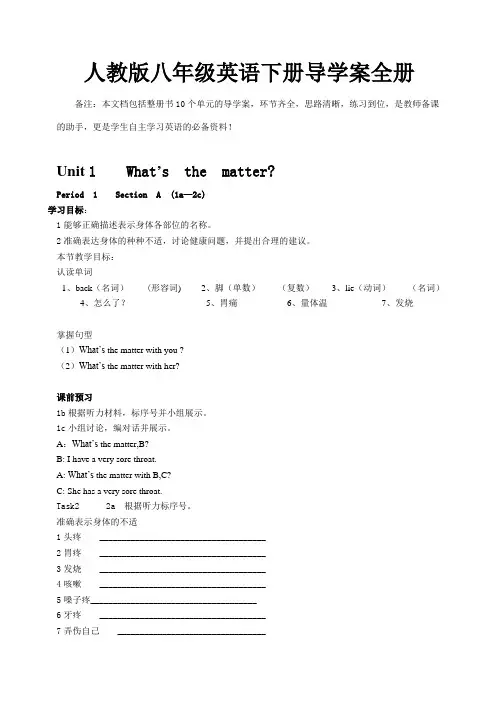
人教版八年级英语下册导学案全册备注:本文档包括整册书10个单元的导学案,环节齐全,思路清晰,练习到位,是教师备课的助手,更是学生自主学习英语的必备资料!Unit 1 What’s the matter?Period 1 Section A (1a—2c)学习目标:1能够正确描述表示身体各部位的名称。
2准确表达身体的种种不适,讨论健康问题,并提出合理的建议。
本节教学目标:认读单词1、back(名词)____(形容词) ____2、脚(单数)____(复数)____3、lie(动词)____(名词)____4、怎么了?_______________5、胃痛_________6、量体温____________7、发烧____________掌握句型(1)What’s the matter with you ?(2)What’s the matter with her?课前预习1b根据听力材料,标序号并小组展示。
1c小组讨论,编对话并展示。
A:What’s the matter,B?B: I have a very sore throat.A: What’s the matter with B,C?C: She has a very sore throat.Task2 2a 根据听力标序号。
准确表示身体的不适1头疼_____________________________________2胃疼_____________________________________3发烧_____________________________________4咳嗽_____________________________________5嗓子疼_____________________________________6牙疼_____________________________________7弄伤自己_________________________________8脖子疼___________________________________9感冒_____________________________________2b 找出合理的建议,并以对话形式小组展示。
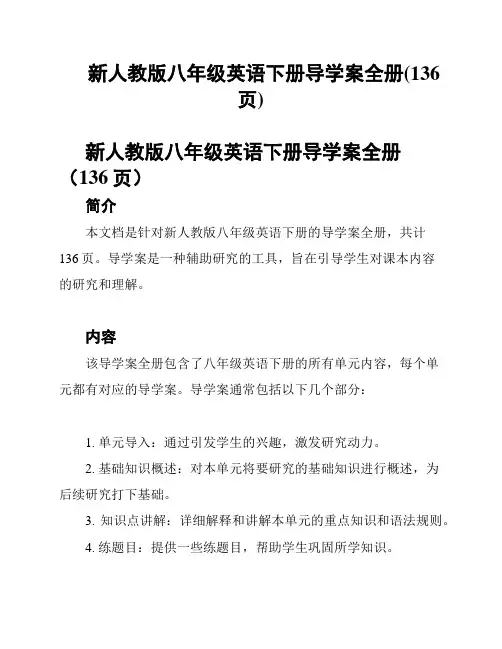
新人教版八年级英语下册导学案全册(136
页)
新人教版八年级英语下册导学案全册(136页)
简介
本文档是针对新人教版八年级英语下册的导学案全册,共计
136页。
导学案是一种辅助研究的工具,旨在引导学生对课本内容
的研究和理解。
内容
该导学案全册包含了八年级英语下册的所有单元内容,每个单
元都有对应的导学案。
导学案通常包括以下几个部分:
1. 单元导入:通过引发学生的兴趣,激发研究动力。
2. 基础知识概述:对本单元将要研究的基础知识进行概述,为
后续研究打下基础。
3. 知识点讲解:详细解释和讲解本单元的重点知识和语法规则。
4. 练题目:提供一些练题目,帮助学生巩固所学知识。
5. 扩展训练:进一步拓展学生的研究能力,让学生运用所学知识进行创造性思考和实践。
使用建议
学生可根据课堂教学情况和个人研究需求,选择性地使用导学案。
导学案是学生自主研究的有力工具,能够帮助学生在课堂外更好地理解和掌握课本内容。
总结
本文档是新人教版八年级英语下册导学案全册,旨在辅助学生学习英语。
导学案通过引发学生兴趣、讲解知识点和提供练习题目等方式,帮助学生深入学习和掌握课本内容。
建议学生根据个人需求灵活使用导学案,提高英语学习效果。
八年级下册学案Unit 1 Will people have robots?Section A一、教师寄语:Confidence in yourself is the first step on the road to success.自信是走向成功的第一步。
二、学习目标:Knowledge goals(知识目标)1.Words&phrases: robot, paper, less, fewer, will, pollution, etc.Target language: Will peopl e …? Yes, they will /No, they won’t .There will be…Grammar:1.学习并掌握will 构成的一般将来时态的陈述句、否定句、疑问句及回答.2. 学习并掌握There be 句型的一般将来时.3. More , less , fewer 的用法.Ability goals(能力目标):用一般过去时、一般现在时和一般将来时谈论过去、现在和将来发生的事情。
(1)-- Will there be less pollution?--No,there won’t.There will be more pollution.--Will there be fewer trees?--Yes,there will.Kids won’t go to school.Kids will study at home on computers.Emotion goals(情感目标):1.通过本课的学习,对未来进行预测。
2.让学生在学习中学会交流、合作,体验学习成就感。
三、教学重难点◆重点由will构成的一般将来时态的句式。
◆难点1.more,less,fewer的用法。
2.there be 句式的一般将来时态there will be…四、学习过程1、预习导学及自测A.英汉互译1.污染_________2.空闲时间______________3.on computers___________4.study at home______5.in 100 years____________6. be free_________B.用more,less,fewer填空:1.There will be ________________(更多的建筑)in 50 years.2.The students will have _______________(更少的家庭作业)to do.3.There will be ________________(更少的污染)here.4.Kids will have ________________(更少的计算机)in their classroom.5.There will be ________________(更多的图书馆)in this city.6.There will be ________________(更少的树)in the park.2、语法小结:一般将来时1)一般将来时由“助动词will+动词原形”构成,表示将来某个时间要发生的动作或存在的状态,常与表示将来的时间状语连用,如:tomorrow,next week,next year,in the future等。
人教版八年级英语下册全册导学案本文档主要是对人教版八年级英语下册的全册研究进行导学,以帮助同学们更好地掌握英语知识。
目录1. Unit 1:Have you ever been to a museum?2. Unit 2:What should I do?3. Unit 3:Under the sea4. Unit 4:Why don't you talk to your parents?5. Unit 5:What were you doing when the rainstorm came?6. Unit 6:I like music that I can dance to7. Unit 7:Teenagers should be allowed to choose their own clothes.8. Unit 8:Why don't you get her a scarf?9. Unit 9:What does he look like?10. Unit 10:Where did you go on vacation?研究内容本文档将针对每个单元的研究内容进行介绍。
通过本文档的研究,同学们将了解到:- 每个单元的主题和研究目标- 各种研究活动的具体内容和要求- 重点单词和短语的用法和记忆方法- 语法知识和句型的运用技巧研究建议- 本文档中给出的研究重点和注意事项是研究的核心内容,同学们一定要认真掌握。
- 在研究过程中需要大量的口语练和听力训练,可以通过跟读、模仿、演讲等方式进行练。
- 研究单词和短语需要掌握记忆技巧,可以通过制作单词卡片、做练题等方式进行巩固。
- 研究语法知识需要理解规则和应用场景,可以通过反复练和写作来提高运用能力。
在学习过程中,同学们应该保持积极的心态,认真学习,勤奋练习,相信自己一定能取得好成绩。
初二英语下册导学案(知识汇总+练习题)Unit 1单词matter [ˈmætə] v. 重要,要紧,有关系What’s the matter? 怎么了?出什么事了?sore [sɔ:(r)] adj. 疼痛的,酸痛的have a cold 感冒stomach ['stʌmək] n. 胃,腹部stomachache ['stʌməkeɪk] n. 胃痛,腹痛have a stomachache 胃痛foot(复数feet) [fu:t] n. 脚neck [nek] n. 颈,脖子throat [θrəʊt] n. 喉咙fever ['fi:və] n. 发烧,发热lie [laɪ] v. 躺,平躺lie down 躺下rest [rest] n. 剩余部分,其余;放松,休息cough [kɒf] n. & v. 咳嗽X-ray ['eksreɪ] n. X光,X射线toothache [ˈtu:θeɪk] n. 牙痛take one's temperature 量体温headache [ˈhedeɪk] n. 头痛have a fever 发烧break [breɪk] n. & v. 休息,暂停;打破take breaks (take a break)休息hurt [hə:t] v. 伤害,损害,使受伤,疼passenger ['pæsɪndʒə] n. 乘客,旅客off [ɒf] adv. prep. 离开(某处);从…去掉get off 下车to one's surprise 使…惊讶,出乎…意料onto [ˈɒntə] prep. 向,朝trouble [ˈtrʌbl] n. 麻烦,烦扰,问题hit [hit] n. & v. 碰撞,打,打击right away 立即,马上get into 陷入,参与herself [hə:ˈself]她自己,她本身(she的反身代词)bandage ['bændɪdʒ] n. & v. 绷带;用绷带包扎sick [sɪk] adj. 患病的,不适的knee [ni:] n. 膝盖nosebleed [ˈnəʊzbli:d] n. 鼻出血breathe [bri:ð] v. 呼吸sunburned [ˈsʌnbɜ:nd] adj. 晒伤的ourselves [ɑ:ˈselvz]我们自己(we的反身代词)climber [ˈklaɪmə(r)] n. 登山者be used to 习惯于… 适应于…risk [rɪsk] n. & v. 风险,危险;冒险take risks (take a risk) 冒险accident [ˈæksidənt] n. 意外事件;事故situation [ˌsitjuˈeiʃən] n. 状况,形式,情况kg=kilogram [ˈkɪləgræm] n. 公斤,千克rock [rɔk] n. 岩石run out (of) 用尽,耗尽knife [naif] n. 刀,餐刀cut off 切除blood [blʌd] n. 血mean [mi:n] v. 意味着,意思是,意欲get out of 离开,从… 出来importance [ɪmˈpɔ:tns] n. 重要性decision [dɪ'sɪʒn] n. 决心,决定,抉择control [kən'trəʊl] v. 控制,支配,操纵be in control of 掌管,管理spirit ['spɪrɪt] n. 勇气,意志death [deθ] n. 死亡give up 放弃nurse [nə:s] n. 护士Unit1 知识梳理【重点单词】matter [ˈmætə] v. 重要,要紧,有关系What’s the matter? 怎么了?出什么事了?sore [sɔ:(r)] adj. 疼痛的,酸痛的have a cold 感冒stomach ['stʌmək] n. 胃,腹部stomachache ['stʌməkeɪk] n. 胃痛,腹痛have a stomachache 胃痛foot(复数feet) [fu:t] n. 脚neck [nek] n. 颈,脖子throat [θrəʊt] n. 喉咙fever ['fi:və] n. 发烧,发热lie [laɪ] v. 躺,平躺lie down 躺下rest [rest] n. 剩余部分,其余;放松,休息cough [kɒf] n. & v. 咳嗽X-ray ['eksreɪ] n. X光,X射线toothache [ˈtu:θeɪk] n. 牙痛take one's temperature 量体温headache [ˈhedeɪk] n. 头痛have a fever 发烧break [breɪk] n. & v. 休息,暂停;打破take breaks (take a break)休息hurt [hə:t] v. 伤害,损害,使受伤passenger ['pæsɪndʒə] n. 乘客,旅客off [ɒf] adv. prep. 离开(某处);从…去掉get off 下车to one's surprise 使…惊讶,出乎…意料onto [ˈɒntə] prep. 向,朝trouble [ˈtrʌbl] n. 麻烦,烦扰,问题hit [hit] n. & v. 碰撞,打,打击right away 立即,马上get into 陷入,参与herself [hə:ˈself] pron. 她自己,她本身(she 的反身代词)bandage ['bændɪdʒ] n. & v. 绷带;用绷带包扎sick [sɪk] adj. 患病的,不适的knee [ni:] n. 膝盖nosebleed [ˈnəʊzbli:d] n. 鼻出血breathe [bri:ð] v. 呼吸sunburned [ˈsʌnbɜ:nd] adj. 晒伤的ourselves [ɑ:ˈselvz] pron. 我们自己(we的反身代词)climber [ˈklaɪmə(r)] n. 登山者be used to 习惯于… 适应于…risk [rɪsk] n. & v. 风险,危险;冒险take risks (take a risk) 冒险accident [ˈæksidənt] n. 意外事件;事故situation [ˌsitjuˈeiʃən] n. 状况,形式,情况kg=kilogram [ˈkɪləgræm] n. 公斤,千克rock [rɔk] n. 岩石run out (of) 用尽,耗尽knife [naif] n. 刀,餐刀cut off 切除blood [blʌd] n. 血mean [mi:n] v. 意味着,意思是,意欲get out of 离开,从… 出来importance [ɪmˈpɔ:tns] n. 重要性decision [dɪ'sɪʒn] n. 决心,决定,抉择control [kən'trəʊl] v. 控制,支配,操纵be in control of 掌管,管理spirit ['spɪrɪt] n. 勇气,意志death [deθ] n. 死亡give up 放弃nurse [nə:s] n. 护士【重点短语】1.have a fever 发烧2.have a cough 咳嗽3.have a toothache 牙疼4.talk too much 说得太多5.drink enough water 喝足够的水6.have a cold 受凉;感冒7.have a stomachache 胃疼8.have a sore back 背疼9.have a sore throat 喉咙痛10. take risks 冒险11.hot tea with honey 加蜂蜜的热茶12.see a dentist 看牙医13.get an X-ray 拍X 光片14.take one’ s temperature 量体温15.put some medicine on sth. 在……上面敷药16. give up 放弃17. sound like 听起来像18. all weekend 整个周末19. in the same way 以同样的方式20. go to a doctor 看医生21. go along 沿着……走22. on the side of the road 在马路边23. shout for help 大声呼救24. without thinking twice 没有多想25. get off 下车26. have a heart problem 有心脏病27. to one’ s surprise 另某人惊讶的是28. thanks to 多亏了;由于29. in time 及时30. make a decision 做出决定31. get into trouble 造成麻烦32. right away 立刻;马上33. because of 由于34. get out of 离开;从……出来35. keep on doing sth. 继续或坚持做某事36. put a bandage on sth. 用绷带包扎37. fall down 摔倒38. feel sick 感到恶心39. have a nosebleed 流鼻血40. cut his knee 割伤他的膝盖41. put her head back 把她的头向后仰42. have problems breathing 呼吸困难43. mountain climbing 登山运动44. be used to doing sth. 习惯做某事45. run out (of) 用完;用尽46. so that 以便47. so...that... 如此……以至于...…48. be in control of 掌管;管理49. in a difficult situation 在闲境中【重点句型】1. What's the matter with you?= What'the trouble with you?= What's wrong with you? 你怎么了?2. What should she do? 她该怎么办呢?3.Should I take my temperature? 我应该量一下体温吗?4.You should lie down and rest. 你应该躺下休息一会儿。
人教版八年级下学期英语全册导学案Unit 1 Where is your pen pal from?导学案1 Section A 1a--Grammar focus【学习目标】1.学会一些国家和城市的英文名称,:会用所学知识,询问和回答人们来自哪里。
2.学会理解和尊重异国文化.【学法指导】1、联系生活学习英语。
敢于用英语表达,用英语进行交际。
2、听力策略:A. 放松心情。
B. 注意关键字【课前准备】准备一张世界地图.【学习过程】一、预习指导与检测(一)预习指导1.预习第1-2页的生词,根据音标会读知意.2.朗读第1-2页的句型,能英汉互译.3.知识点拨:1)Where is/are + 主语 + from ?这一特殊疑问句用来询问某人来自哪里,回答时,用主语+is/are +from+地点。
eg:Where are you from? I’m from Chaohu. Where is he from? He’sfromHefei.拓展:be from = come from be是系动词,come 是实义动词eg: Where does he come from? He comes from Hefei.2)live 不及物动词,意思是“居住”不能直接加地点,需要有介词.eg: ----- Where does she live? ------She lives in Paris.3)pen pal =pen friend 笔友4)China 中国 Chinese 中国人 Japan 日本 Japanese 日本人eg:We are all Chinese. The three girl are Australians. (二)预习检测1.你知道这些国家和地区的英文名称吗?(1)中国_______(2) 加拿大________ (3)法国________(4)英国_________(5)澳大利亚______(6) 美国_______(7)新加坡______ (8)悉尼________(9) 巴黎_______(10)纽约________(11)多伦多_______(12)东京_________二、课堂互动探究1. 小组活动:1) 共同总结本节课的重点单词及短语,然后互相提问。
人教版新目标初二八年级英语下册全套导学案(可编辑)人教版新目标初二八年级英语下册全套导学案人教版新目标八年级英语下册全册导学案目录Unit1 section A 1a-2c 1课时 1Unit1 section A 3a-4 1课时 3Unit1 section B 1 a-2 c 1课时 5Unit1 section B 3a-4 1课时 7Unit1 section B Reading 1课时 9Unit 2 section A 1a-2c 1课时 11Unit 2 section A 3a-4 1课时 13Unit 2 section B 1a ― 2c 1课时 15Unit 2 section B 3a ― 4 1课时 17Unit 2 self check-reading 1课时 19Unit3 section A 1a-2c 1课时 21Unit 3 section A 3a-4 1课时 23Unit 3 section B 1a-2c 1课时 25Unit 3 section B 3-4b 1课时 27Unit 3 Self check - Reading 1课时 29Unit 4 section A 1a-2c 1课时 31Unit 4 section A 3a-4 1课时 33Unit 4 section B 1a-2c 1课时 35Unit 4 section B 3a -Self check 1课时 37Unit 4 Reading 1课时 39Unit 5 section A 1a-2c 1课时 41Unit 5 section A 3a-4 1课时 43Unit 5 section B 1a-2c 1课时 45Unit 5 section B 3a -Self check 2课时 47 Unit 6 section A 1a-2c 1课时 49Unit 6 section A 3a-4 1课时 51Unit 6 section B 1a-2c 1课时 53Unit 6 section B 3a -Self check 2课时 55 Unit 6 Reading 1课时 57Unit7 Section A 1a-2c 1课时 59Unit7 Section A 3a-4 1课时 61Unit7 Section B 1a -2c 1课时 63Unit7 Section B 3a -4 1课时 65Unit7 Reading 1课时 67Unit8 Section A 1a -2c 1课时 69Unit8 Section A 3a-4 1课时 71Unit8 Section B 1a -2c 1课时 73Unit8 Section B 3a -4 1课时 75Unit8 Reading 1课时 78Unit9 Section A 1a-2c 1课时 80Unit9 Section A 3a -4 1课时 82Unit9 Section B 1a-2c 1课时 84Unit9 Section B 3a-4 1课时 86Unit9 Reading 1课时 88Unit 10 Section A 1a-2c 1课时 90Unit10 Section A 3a -4 1课时 92Unit1 0 Section B 1a-2c 1课时 94Unit 10 Section B 3a-4 1课时 96Unit1 0 Self check 1课时 98八年级英语下册导学案will 构成的一般将来时态的陈述句、否定句、疑问句及回答。
2013年人教版八年级英语(下册)导学案【课题】 Unit1 section A 1a-2c ( 1课时)【学习目标】学会用将来时态预言。
【重点、难点】1.will 构成的一般将来时态的陈述句、否定句、疑问句及回答。
2. There be 句型的一般将来时。
【导学指导】温故知新小组讨论设想未来世界的变化。
运用be going to谈论将来的计划和打算。
自主互助学习知识剖析:一般将来时态构成: will / be going to +动词原形1.用be going to do表示将来:主要意义,一是表示“意图”,即打算在最近的将来或将来进行某事。
Are you going to post that letter? I am going to book a ticket.另一意义是表示“预见”,即现在已有迹象表明将要发生或即将发生某种情况。
It’s going to rain.2.用will/ shall do表示将来:You will feel better after taking this medicine. 助动词will+动词原形I will not lend the book to you. 变否定句直接在will后加notShe will come to have class tomorrow.Will she come to have class tomorrow? 变一般疑问句,直接把will提到句首。
Yes,she will/ No.she won’t .3. fewer 与less及more表数量的用法。
1)few(形容词)“几乎没有,很少的”,修饰可数名词。
其比较级、最高级为规则变化:few-fewer-fewe st“a few”表示“一些”“few”带否定含义,“几乎没有”。
2)little(形容词)“很少的,几乎没有的”(“小的,幼小的”),修饰不可数名词。
其比较级、最高级为不规则变化:little-less-least。
例:There will be less pollution. “a little”表“一些”,“little”带否定含义,“几乎没有”。
3)many“许多”,修饰可数名词。
much“许多”,修饰不可数名词。
比较级、最高级为不规则变化:many / much -more-most。
重点难点释义:1. In ten years 十年后 In+一段时间:…..之后in 5 months :5个月后 in 3 years: 3年后 in a week: 一周后I′ll be a reporter in ten years.十年后我会是一个记者学习过程:1.小组看图1a,完成下列对话。
A: Will people have ________ in their homes?B: Yes, ________ ________. I think every home will have one.2. 小组合作讨论预测未来世界的变化完成1a 。
3. 小组合作训练 1)will 构成的一般将来时态的陈述句、否定句、疑问句及回答。
2)There be 句型的一般将来时。
4. 听力技能提高。
1)听录音完成1b 。
2)听前预测2a/2b 。
3) 听录音完成2a/2b 。
5.综合运用能力提高。
小组合作运用将来时的句型对未来作出预测。
完成1c/2c 。
【课堂练习】一、根据汉语意思,完成句子。
一空一词。
1. 书籍将会仅仅在电脑,而不在纸上。
Books _____ only _____ on computers, not _____ paper.2. 今后在这座城市将会有更多的树木,更少的污染。
Will _____ _____ trees and _____ pollution in the city in future.3.你认为人们家里将会有机器人吗?Do you will be in people’s homes?4. 他们不会去野营。
我确信他们将来参加我们的聚会。
They _____ go . They _____ come to our party, I’m sure.5.100年后孩子们还要去上学吗?---不,他们将不用上学.------ kids go to school 100 years------ No, they【要点归纳】1.will 构成的一般将来时态的陈述句、否定句、疑问句及回答。
2. There be 句型的一般将来时。
【拓展练习】一、单项选择()1.I ________ rockets to the moon when I grow up.A. will putB. will flyC. will take()2.If there are ________ trees, the air in our city will be ________ cleaner.A. less; moreB. more; moreC. more; much()3.I predict he will be an engineer ________ ten years because he is so interested in making things.A. inB. afterC. later()4.There were many famous predictions that never ________ .A. come trueB. came realC. came true()5.“The work of Picasso will never be ________ anything, ”someone said.A. costB. worthC. spend【总结反思】【课题】 Unit1 section A 3a-4 (1课时)【学习目标】1.理解并会用句型what do you think …will be in 10 years?预测未来。
2.会用过去.现在.将来三个时态谈论自己的经历与打算。
【重点、难点】用will句型预测未来。
【导学指导】温故知新一、翻译短语。
1)将会有… 2)更少的人3)10年以后 4)更多的使用地铁5)更多的污染 6)免费的7)谈论 8)更少的汽车二、写出下列动词的过去式。
live play study work finishtry be have buy teachget take eat fall drive自主互助学习课前预习小组合作,在课本上找出下列短语和句子并在课文上标记出来。
1)在高中 2)在大学3)5年前 4)5年后5)更多的高楼 6)打网球7) 你认为5 年后Sally 会什么样?8) 我认为有更多的高楼。
9) 我认为没有更多的高楼。
10) 将会有更少的小车、更多的公共汽车吗?课堂流程1. five years ago now in 20 years|________|________________|___________________|看上图讨论自己的情况:Five years ago I lived in a small house . now I live in a big and clean house ,in 20 years, I will have my own house with a big garden and a swimming pool .2.小组合作看图3a 描述Sally 的情况完成3a 。
3.做Pair work: 3b 练习目标语言,完成下列句型:1)那儿将有更少的污染2)每家都会有一个机器人3)你认为人们100年后还用钱吗? 4)孩子们将在家里通过电脑学习4.独立完成P4的3c: Write about yourself.让部分学生读出自己写的内容,并及时更正与核对答案。
5.综合技能提高小组完成Part 4 。
【课堂练习】一、用括号内所给词的适当形式填空。
1. They _________ ( not have ) any classes next week.2 . Betty _________ ( write ) to her parents tomorrow.3. Look at those clouds. It _________ (rain ).4. He _________ ( read ) an English book now.5. Look! Many girls _________ (dance) over there.6. She _________(not visit) her aunt last weekend.She ________ (stay) at home and _________(do) some cleaning.7. I am afraid there ___________(be)a meeting this afternoon. I can’t join you.8. Tomorrow __________ ________ (be) a sunny day again.9. What are you __________ (go) to do this afternoon?10. We_______ (be) _________ ________(go) have a meeting tomorrow.【要点归纳】用will句型预测未来。
【拓展练习】一、单项选择。
( )1. —Will people live to be 300 years old? —_________.A. No, they aren'tB. No, they won'tC. No, they don'tD. No, they can't( )2. There will be _________ pollution this year than last year.A. fewerB. muchC. lessD. many( )3. I think people here are friendly. Do you agree _________ me?A. withB. toC. onD. from( )4. —Where is Miss Wang?—She went to Hainan Island last week and will return ________ six days.A. agoB. laterC. behindD. in( )5. —_________ will they play? —They will play football.A. What subjectB. What sportC. What foodD. What language( )6. I will see you again _________.A. a dayB. every dayC. one dayD. everyday( )7. Toby often talks ___but does ___.So everybody says he is a good boy.A. little, manyB. less, moreC. more, lessD. many ,little【总结反思】【课题】 Unit1 section B 1 a-2 c (1课时)【学习目标】1.听力练习。